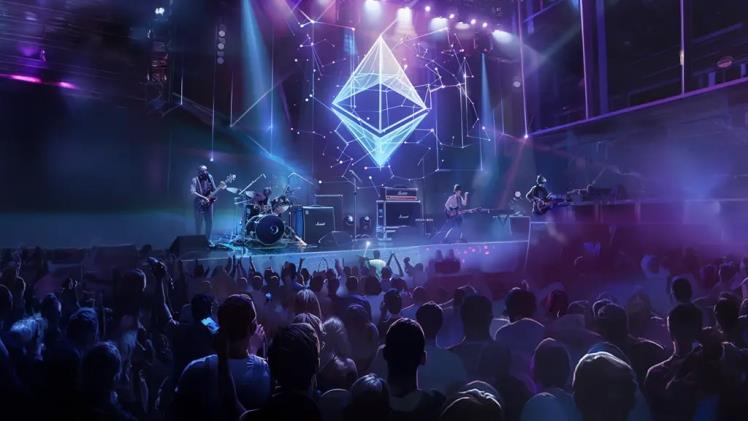The music industry has undergone a massive transformation over the last few decades, from vinyl records to digital downloads, and now to streaming services. However, the next big leap might come from an unexpected quarter: virtual concerts powered by blockchain technology. As the cryptocurrency Ethereum gains prominence, its potential to revolutionize the music industry, particularly through virtual concerts, becomes increasingly evident. This article explores how the fluctuations in Ethereum Price could reshape the future of music and entertainment.
The Rise of Virtual Concerts
Virtual concerts are not a new concept, but they gained significant traction during the COVID-19 pandemic. With live events canceled worldwide, artists turned to virtual platforms to reach their audiences. Platforms like Fortnite and Minecraft hosted concerts that attracted millions of viewers, demonstrating a massive potential market. However, the experience of attending a virtual concert can be limited by technological constraints and the lack of real-world interaction.
Enter blockchain technology and Ethereum. Ethereum’s smart contract capabilities offer a new way to enhance the virtual concert experience, making it more immersive, interactive, and rewarding for both artists and fans. ETH Price Ethereum, a decentralized platform that enables smart contracts, has the potential to revolutionize various sectors, including the music industry. As ETH Price increases, so does the interest in its applications, leading to more innovation and investment.
Ethereum and the Music Industry
Ethereum, a decentralized platform that enables smart contracts, has the potential to revolutionize various sectors, including the music industry. As Ethereum Price increases, so does the interest in its applications, leading to more innovation and investment.
One of the most exciting possibilities is the creation of unique, tokenized experiences for fans. Artists can sell virtual tickets as non-fungible tokens (NFTs) on the Ethereum blockchain. These NFTs can grant fans access to exclusive content, backstage passes, or even virtual meet-and-greets.
Benefits of Blockchain-Powered Virtual Concerts
- Enhanced Security and Transparency
Blockchain technology ensures that transactions are secure and transparent. By using Ethereum for ticket sales and other transactions, artists can reduce the risk of fraud and ensure that all parties involved are treated fairly. Smart contracts can automate payments to artists, producers, and other stakeholders, ensuring that everyone gets their fair share without the need for intermediaries.
- Immersive Fan Experiences
Virtual concerts powered by Ethereum can offer more immersive experiences than traditional virtual events. With the help of virtual reality (VR) and augmented reality (AR), fans can feel like they are truly part of the concert, interacting with other attendees and even the artists themselves. These experiences can be tokenized and personalized, offering fans unique moments that cannot be replicated.
- New Revenue Streams
The rise in Ethereum Price can open up new revenue streams for artists. By selling NFTs and other digital assets, artists can monetize their work in ways that were previously impossible. These digital assets can appreciate in value over time, providing a continuous source of income. Additionally, artists can earn royalties every time their NFTs are resold, thanks to the traceability of blockchain technology.
- Direct Artist-to-Fan Engagement
Ethereum enables artists to engage directly with their fans, bypassing traditional intermediaries like record labels and concert promoters. This direct engagement can foster a stronger connection between artists and their audience, leading to a more loyal and engaged fan base. Fans can also feel more invested in their favorite artists’ success, as they can own a piece of the virtual experience through NFTs.
Challenges and Considerations
While the potential for Ethereum to revolutionize virtual concerts is immense, there are several challenges and considerations to keep in mind.
- Price Volatility
Ethereum Price is notoriously volatile, which can impact the value of NFTs and other digital assets. This volatility can make it challenging for artists and fans to predict the value of their investments. However, as the market matures and stabilizes, this volatility may decrease, making Ethereum a more reliable platform for virtual concerts.
- Technical Barriers
The technology required to create immersive virtual concerts is still in its infancy. High-quality VR and AR experiences require significant computing power and bandwidth, which may not be accessible to all fans. Additionally, the process of creating and managing NFTs on the Ethereum blockchain can be complex and requires technical expertise.
- Environmental Concerns
The energy consumption of blockchain networks, including Ethereum, has raised environmental concerns. As Ethereum Price increases and more transactions are processed, the network’s energy usage also rises. However, Ethereum is transitioning to a proof-of-stake (PoS) consensus mechanism, which is expected to significantly reduce its energy consumption.
The Road Ahead
Despite these challenges, the future of virtual concerts powered by Ethereum looks promising. As the technology continues to evolve and the Ethereum Price stabilizes, we can expect to see more artists and fans embracing this new way of experiencing music.
- Innovations on the Horizon
Several companies and startups are already exploring the potential of Ethereum in the music industry. For example, platforms like Audius and Ujo Music are leveraging blockchain technology to create decentralized music streaming services. These platforms offer artists more control over their work and provide fans with a more transparent and fair way to access music.
- Adoption by Mainstream Artists
As more mainstream artists experiment with virtual concerts and NFTs, the adoption of Ethereum in the music industry will likely accelerate. High-profile artists like Grimes, Kings of Leon, and Deadmau5 have already embraced NFTs, showcasing the potential of this technology to a broader audience.
- A New Era for Live Music
The integration of Ethereum into the music industry could herald a new era for live music, where virtual concerts are as popular and lucrative as physical events. Fans will have more ways to connect with their favorite artists, and artists will have more tools to monetize their work and engage with their audience.
As Ethereum continues to gain traction, its applications in the music world will likely expand, offering artists and fans new ways to experience and enjoy music. While there are challenges to overcome, the future of virtual concerts powered by Ethereum looks bright, promising a more immersive, engaging, and equitable music industry for all.






